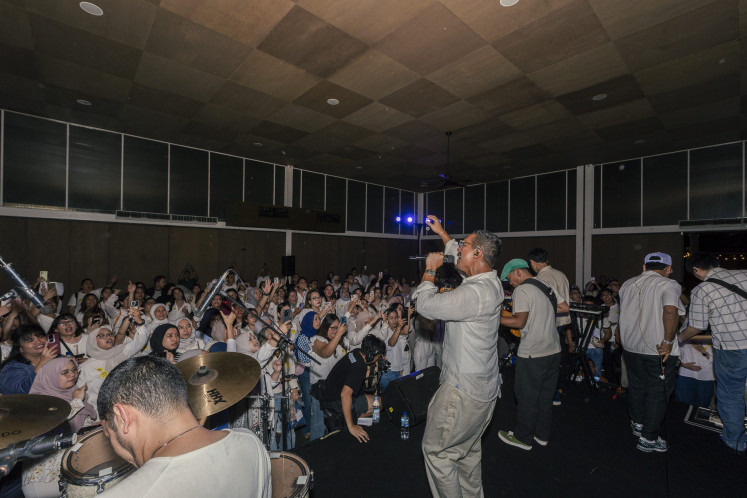Popular Reads
Top Results
Can't find what you're looking for?
View all search resultsPopular Reads
Top Results
Can't find what you're looking for?
View all search resultsFace-to-face with orangutans
Feeding time: Juvenile orangutans feed on rambutan
Change text size
Gift Premium Articles
to Anyone
Feeding time: Juvenile orangutans feed on rambutan.
At just over 200,000, the population of Pangkalan Bun, in Kotawaringing Barat regency, Central Kalimantan is a drop in the ocean relative to Indonesia's some 240 million people.
But the nondescript area is also home to another population of some 6,000 that makes it one of the most important places on earth.
That is the local population of endangered orangutans ' animals that share 97 percent of their DNA with humans and are rapidly facing eviction from where they have resided since prehistory: tropical forests.
While the conversion of Kalimantan's forests has provided some companies with lucrative revenue, other groups ' from the private, public and non-governmental sector ' are currently working to protect orangutans and the forests that they inhabit.
The plight of the orangutans has also caught the attention of former US president Bill Clinton, who recently arrived in Pangkalan Bun as part of a series of visits across Asia to projects supported by The Clinton Foundation.
The visit was the second stop on his latest tour of Indonesia, after Aceh in Sumatra, where he spearheaded international efforts to restore damage caused by the 2004 tsunami.
His delegation included over 50 major donors to the foundation, and the visit was the first for partners of The Clinton Climate Initiative's Forestry Program.
The largely American delegation's first destination within Pangkalan Bun was the Orangutan Care Center and Quarantine (OCCQ) in Pasir Panjang village, where delegates were welcomed by Biruté Mary Galdikas, president of the Orangutan Foundation International (OFI) and a leading authority on orangutans.
Orangutans at the center are divided into different age groups. Visitors, before being guided inside, are instructed to wash their hands and put on masks ' human illnesses such as the common cold can be transmitted to orangutans.
The first group of orangutans were young juveniles ' each of whom are known to the center's staff by name, and who climbed about the girders of a structure housing a fresh pile of rambutan while showing intent curiosity toward the new faces.
With its local partners, Rimba Raya and The Katingan Project, which received support from The Clinton Foundation, the OCCQ works to conserve forest areas in central Kalimantan within the framework of the UN's Reducing Emissions from Deforestation and Forest Degradation (REDD+) program.
REDD+ focuses on quantifying carbon stocks while recognizing the need to safeguard the livelihoods of forest-dependent communities and local biodiversity.
Jim Procanik of Rimba Raya highlighted the project's work to provide clean water to households in the local community as well as a partnership with Galdikas to release at least 60 orangutans into a forest conservation area of nearly 65,000 hectares.
Dharsono Hartono, CEO of PT Rimba Makmur Utama (RMU) and founder of The Katingan Project, also revealed work to conserve over 100,000 ha of peatland forests in Katingan district.
In partnership with Photovoices International, the project also provided cameras and photography training to 30 villagers, giving an insight into the livelihoods and needs of local community members.
Dharsono said that, through his work, he tried to set a precedent of how companies can work with communities by giving out his cellphone number to community members that he met during familiarization processes.
'I did this because I believe we need to be transparent about our processes, and if communities have questions or comments, they can contact me directly so we can avoid any misunderstandings and treat each other as partners,' he said.
The visitors were also shuttled in speedboats to Camp Leakey in the swamps of Tanjung Puting National Park.
The camp, which was established in 1971 by Galdikas with her former husband, acts as a permanent research base for scientists and students studying the rich biodiversity within the natural habitat. Its name is in honor of Louis Leakey, who mentored Galdikas as well as other legendary ape experts such as Jane Goodall and Dian Fossey.
During the visit, the delegation's boats docked in a clearing along the Sekonyer River and the guests were guided down a wooden walkway leading into the forest.
Soon, in order to attract the orangutans, park rangers' ghostly calls began to reverberate throughout the forest. Shortly after arriving at a feeding platform, the visitors were joined by an agile gibbon, followed by several orangutans.
Galdikas identified one of the orangutans on the feeding platform as Akmad, who appeared with her on the cover of National Geographic magazine in October 1975.
The sweat-drenched spectators were awed by the large apes' fluid maneuvers between lofty branches, including one mother who had two babies latched onto her as she swung.
Galdikas revealed to the visitors earlier that even though it is against the law, many palm oil concessionaries kill orangutans as they see them as agricultural pests, or in order to take their offspring to sell as pets on the black market.
'Virtually all the orangutans here are orphans. Their mothers were killed and they were captured. We work with the forestry department and the police to confiscate orangutans. We bring them here and begin the long process of trying to rehabilitate them to go back into the wild.'
- Photos by Lawrence Lilley











